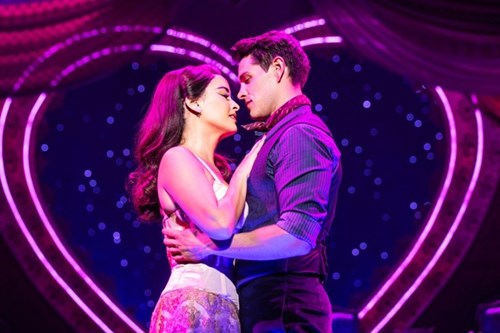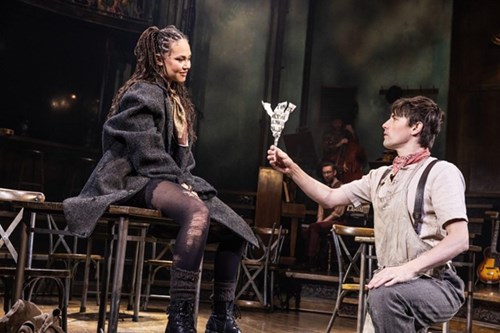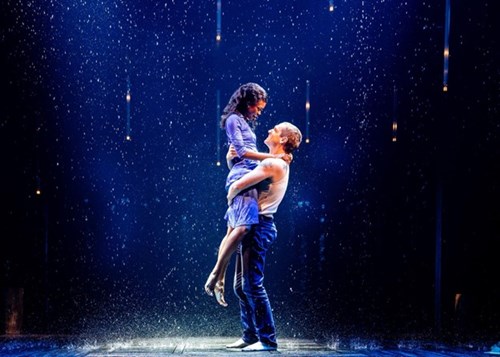
Broadway has long been a haven for love stories that leave audiences swooning, laughing, and even crying. These tales of passion, yearning, and devotion have been immortalized on the stage, captivating the hearts of millions and proving that love is a universal language that transcends cultures and borders. Love stories are the lifeblood of Broadway shows, offering a profound exploration of human emotions and relationships that we can all relate to. They weave an intricate tapestry of romance and heartbreak, their magic often lying in their ability to move us, to make us reflect on our own relationships, and to make us believe in the power of love.
Over the years, Broadway has treated us to countless love stories, each with its own unique appeal. They have made us laugh, cry, and everything in between, their narratives touching on various facets of love and relationships. From timeless classics such as West Side Story and The Phantom of the Opera to modern hits like Hamilton and Hadestown, these shows have given us some of the most memorable and romantic moments on stage.
Aladdin, a magical and enchanting Broadway show, is a brilliant adaptation of Disney's 1992 animated film. The story is set in the mythical city of Agrabah and follows the journey of Aladdin, a street urchin with a heart of gold. The narrative unfolds to reveal a love story that transcends class and wealth, as Aladdin falls head over heels for the beautiful and independent Princess Jasmine.
The love story between Aladdin and Jasmine is a mesmerizing tale that captures the essence of true love and the power of authenticity. Aladdin, despite his humble beginnings, wins the heart of Jasmine not with riches or status, but with his genuine personality and bravery. Their love story is a testament to the fact that love knows no bounds and that true connection is based on who we are, not what we have.
One of the most romantic and iconic scenes in Aladdin is the "A Whole New World" carpet ride, where Aladdin takes Jasmine on a magical journey across the stars. This enchanting scene captures the beauty of new love and the thrill of adventure, as Aladdin and Jasmine explore a whole new world together, their bond growing stronger with every moment. The scene, filled with awe-inspiring visuals and heartwarming melodies, perfectly encapsulates the magic of love and the joy of shared experiences.

Hadestown, a captivating and innovative musical, reimagines two mythical tales of love and sacrifice. The show intertwines the tragic love story of Orpheus and Eurydice with the tale of Hades and Persephone, offering a haunting exploration of love, loss, and the human capacity for hope.
At the heart of Hadestown is the love story of Orpheus, a gifted musician, and Eurydice, a young woman struggling to survive. Their love, though passionate and profound, is tragically tested by harsh realities and the allure of promises. Despite the odds, their love story is a testament to the indomitable spirit of love and the lengths one is willing to go for it.
One of the most poignant scenes in Hadestown is the "Wait for Me" scene, where Orpheus embarks on a perilous journey to the Underworld to reunite with Eurydice. Fueled by love and hope, Orpheus defies the gods and descends into the depths of Hades, showcasing the resilience of love in the face of adversity.
The recent addition to the Broadway family, the stirring musical adaptation of Sara Gruen's best-selling novel, Water for Elephants has been making waves in the theatre world with its compelling narrative and enchanting musical score. The love story at the heart of this tale is beautifully told and brought to life on stage in a way that only Broadway can. One particular moment that stands out as one of the most romantic on stage is during the song "Wild." This heart-rending duet between the story's star-crossed lovers, Jacob and Marlena, showcases not only their undeniable chemistry but also their shared longing for freedom and love. The raw emotion and passion conveyed in this song is palpable, making it one of the standout romantic moments in recent Broadway history.
Hamilton, a groundbreaking and critically acclaimed musical, brilliantly weaves the story of Alexander Hamilton, one of America's founding fathers. Through a fusion of hip-hop, rap, and traditional musical theatre, the show presents an immersive view of America's past, replete with political maneuverings, personal struggles, and complex relationships.
One of the most compelling narrative threads in Hamilton is the intricate love triangle between Alexander Hamilton, Eliza Schuyler, and her elder sister, Angelica. The dynamics between these three characters add a layer of emotional complexity to the narrative, exploring themes of love, duty, and sacrifice. While Hamilton marries Eliza, it is Angelica who shares a deep intellectual connection with him, leading to a poignant narrative of unrequited love.
The song "Satisfied" is a powerful testament to this unrequited love. Sung by Angelica, it paints a vivid picture of her deep-seated feelings for Hamilton and her selfless decision to step aside for her sister's happiness. The song, filled with raw emotion and regret, gives a voice to Angelica's silent sacrifice, offering a heart-wrenching glimpse into the depth of her love for Alexander.
Moulin Rouge! is a dazzling spectacle of a musical that transports audiences to the Montmartre Quarter of Paris at the turn of the 20th century. Based on Baz Luhrmann's 2001 film, the show is an opulent feast for the senses, combining high-energy performances with a vibrant pop-rock score.
At the center of Moulin Rouge! is the passionate love story between Christian, a penniless writer, and Satine, the star courtesan of the Moulin Rouge. Their relationship is a whirlwind of desire and desperation, a love that defies societal norms and expectations, and ultimately leads to heartbreak.
One of the most captivating moments in the show is the "Come What May" scene. In this scene, Christian and Satine pledge their love to each other, vowing to stay together "come what may". The song, with its soaring melodies and heartfelt lyrics, perfectly encapsulates the Bohemian ideals of love and freedom that the characters cherish. It is a promise of unconditional love, a testament to their commitment to each other despite the challenges they face.

The Notebook, based on Nicholas Sparks's best-selling novel and subsequent film adaptation, has made its way to the stage with a beautiful musical adaptation. The show, set in the backdrop of the American South during the 1940s, is a touching exploration of love, memory, and the enduring power of our most cherished moments.
The story revolves around Allie and Noah, who despite hailing from different social backgrounds, fall deeply in love. Their love story is a moving portrayal of passion, sacrifice, and the enduring nature of true love that transcends time and circumstance. Their tale is heart-wrenchingly beautiful, illustrating the power of love to withstand the tests of time and the challenges of life.
The song "If This is Love" in The Notebook is a beautiful representation of Allie and Noah's profound love for each other. The song, filled with raw emotion and touching lyrics, perfectly captures the depth and intensity of their feelings. It powerfully conveys the longing, heartache, and the undying love that defines their relationship.
These love stories, each unique and powerful in its own right, illustrate the magic of Broadway – its ability to touch hearts, stir emotions, and make you reflect on your own experiences of love. They serve as a testament to the power of love stories on Broadway, to their ability to captivate audiences, stir emotions, and leave lasting impressions.
So, whether you're a Broadway aficionado or a newcomer to the theatre scene, be sure to explore these shows and others on Broadway. Discover the stories they tell, the emotions they evoke, and the magic they hold. After all, Broadway is not just about the spectacle; it's about the stories, the characters, and most importantly, the experience of being human – in all its love, loss, joy, and sorrow.